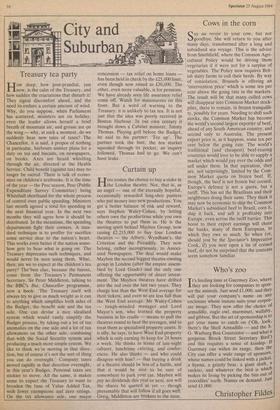Treasury tea party
How deep. how post-prandial, just now, is the calm of the Treasury, and how sudden the eructations that disturb it! They signal discomfort ahead, and the need to endure a certain amount of wind. Why, do you suppose, when Parliament has scattered, ministers are on holiday, even the leader allows herself a brief breath of mountain air, and grouse are on the wing — why, at such a moment, do we suddenly hear new tales of taxes? The Chancellor, it is said, a propos of nothing in particular, harbours sinister plans for a duty on tea and biscuits, on newspapers, on books. Axes are heard whistling through the air, directed at the Health Service. Child benefit (against tax) may no longer be sacred. There is talk of econo- mies on children's textbooks. It is the time of the year — the Pesc season, Pesc (Public Expenditure Survey Committee) being Whitehall shorthand for the whole process of control over public spending. Ministers last month agreed a total for spending in the next financial year. In the next two months they will agree how it should be distributed. In the meantime, the spending departments fight their corners. A stan- dard technique is to proffer for sacrifice some service dear to the nation's heart. This works even better if the nation some- how gets to hear what is going on. The Treasury deprecates such techniques, and would never be seen using them. What, then, are we to expect at the children's tea party? The-best clue, because the fairest, come from the Treasury's Permanent Secretary, Sir Peter Middleton, talking to the BBC's But, Chancellor programme, now a book: 'The Treasury itself will always try to give as much weight as it can to anything which simplifies both sides of the Budget. the benefit side and the tax side. One can devise a nice idealised system which would vastly simplify the Budget process, by taking out a lot of tax anomalies on the one side and a lot of tax allowances on the other side, combining that with the Social Security system and producing a much more simple system. We like to think we're moving in that direc- tion, but of course it's not the sort of thing you can do overnight.' Company taxes moved rapidly in that direction overnight, in this year's Budget. Personal taxes are stickier to move. All the same, it makes sense to expect the Treasury to want to broaden the base of Value Added Tax, with fewer exemptions and zero ratings. On the tax allowance side, one major
concession — tax relief on home loans has been held in check by the £25,000 limit, even though now raised to £30,000. The other, even more valuable, is for pensions. We have already seen life assurance relief come off. Watch for manoeuvres on this front. But a word of warning to the Treasury: it is unlikely to tax tea. It is not just that the idea was poorly received in Boston Harbour. In our own century it brought down a Cabinet minister, Jimmy Thomas. Playing golf before the Budget, he said to his partner: 'Tee up'. The partner took the hint, the tea market squealed through its pocket, an inquiry followed, Thomas had to go. We can't have leaks.






































 Previous page
Previous page